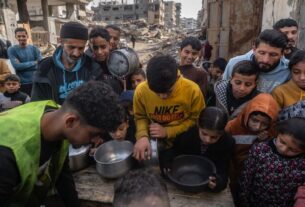The recent emergence of a video featuring a German nurse abducted in Somalia has shed light on the challenging circumstances faced by German nationals taken hostage overseas.
Seven years ago, Sonja N.* was abducted in Somalia while serving as a nurse for the International Red Cross. In a distressing video plea, she called upon the German government and her family to secure her release, citing deteriorating health conditions.
Hundreds of German citizens have been abducted abroad over the years, with precise figures remaining elusive. In 2019, the German government reported 143 abductions in 37 countries between 2010 and 2019, with notable cases occurring in countries such as Nigeria, Afghanistan, Mexico, Syria, and Senegal.
In response to abductions, the Foreign Ministry establishes a crisis team to coordinate efforts across various agencies, including embassies and intelligence services. Jürgen Chrobog, who previously led such a team, emphasized the importance of building trust with intermediaries to understand the situation and demands effectively.
While professional negotiators like Chrobog have navigated successful hostage releases in the past, the majority of victims are individuals such as nurses, aid workers, tourists, and clergy. These individuals often endure harrowing experiences while in captivity, with some cases gaining public attention after their release.
One recent case involved Roman Catholic clergyman Hans-Joachim Lohre, who was held captive in Mali for nearly a year. Lohre’s survival strategy involved prayer and attempts to engage his captors in religious dialogue. Following successful negotiations, he was eventually released, emphasizing the significance of interfaith cooperation in his liberation.
Instances of state-sponsored abductions, as seen in Iran, have also occurred, with both tragic and positive outcomes. While some hostages face dire consequences, others like Nahid Taghavi have been successfully released, often through a combination of quiet diplomacy and public advocacy.
Advocates like Mariam Claren, whose mother was detained in Iran, stress the importance of immediate public awareness to protect detainees. Claren’s collaboration with human rights organizations and government agencies highlights the value of combined efforts in securing the release of abducted individuals.
The recent video of the German nurse in Somalia underscores the urgency of addressing abduction cases and maintaining public awareness to ensure the safety and well-being of victims. Heightened pressure and continued advocacy are essential in safeguarding the interests of those held captive abroad and preventing their plight from being forgotten.



